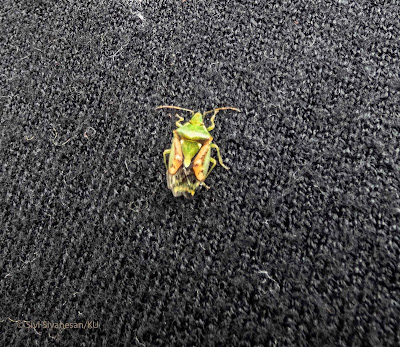We had a great turn out for the Penrhyn Road Pond TLC event....
The pond located in the Forensics garden (just by the relocated e-bike stands) contains two highly invasive pond plants.
 |
| Dense vegetation mat due to invasive plants |
These plants have either come in through infected pond plants brought in for the pond years ago, or were a “gift” from some well-meaning person deciding to clear out their garden pond or aquarium and decided that they didn’t want to have the plants go to waste. Unfortunately this is often how invasive pond plants in urban areas spread around.
 |
| careful hand removal of invasives from nooks and crannies around the pond |
 |
| What a difference some volunteers make :) |
These links (in the plant name) tell you more about these species and the issues that they pose to wildlife and native habitats.
The two plants New Zealand Pigmyweed and Floating Pennywort - grow fast, and the smallest fragments can lead to new plants, so its dangerous to move them off site as we risk spreading the plants.
A few years ago, we created a small compost area in the garden (read all about it here) which we use purely for invasive species, to avoid moving them between sites and potentially spreading them to other areas.
 |
| Heave.. |
 |
| Clearing the climbers...where they could be reached |
The team quickly filled it with all of the plants we were able to get out of the pond, as well as with some of the passionflower that had gotten out of control and removing some of the dead vegetation from our shrubs which had been affected by the heat over the summer.
 |
| Carefully pruning the dead bits out of the shrub canopy |
Until today I had thought that the variety of passion flower that we had wasn’t edible but according to the RHS, you can eat the fruit…but with caution!!, as under-ripe fruit (yellow) can give you a stomach upset, whereas the orange fruit are edible….(does this bring the whole blue/black and white/gold dress debate to mind?).
 |
| A full compost heap |
who decided to pop their heads out to see what was going on.
 |
| more room to swim and warmer waters with the sun able to get to the water column makes Kermita a happy frog |
 |
| Are you hard enough to take on a biodiversity volunteer ;) |
 |
| The 7th member of the team |
One of the team also saw a much smaller frog, which is a hopeful sign, as we haven’t seen evidence of the young tadpoles maturing into the mini-frog stage – which might have indicated the presence of a rana-virus (again largely spread in urban areas by people moving animals and spawn around! -see these links for more info link 1 and link 2 . Hopefully this means that we’ll have some new recruits into our frog population at Penrhyn Road.
The one thing we can guarantee is that, due to the rate of plant growth, we will be back again next year. If you’re interested in volunteering with us when that time comes around again, or finding out how you can help with our other volunteering events, visit our new Eventbrite page, which has (nearly) all of our events listed, or email biodiversity@kingston.ac.uk
Until next time...


No comments:
Post a Comment